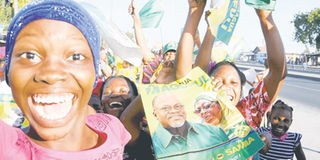The question about governance

Supporters of Dr John Magufuli, who was then the ruling party CCM’s presidential candidate in the 2015 General Election, celebrate after he was declared the winner. Looming elections in at least 14 African countries next year have triggered a flurry of governance report by international research bodies. PHOTO|FILE
What you need to know:
- What has become an indelible feature of election seasons in African countries is the unveiling of a flurry of “governance reports” claiming scientific and methodological authenticity, but seemingly calibrated to influence election campaigns and hopefully sway their outcome. And 2017 is no exception.
Undoubtedly, 2017 will be the year of elections. Of the 193 United Nations member states, 52 (or 27 per cent) will be holding elections, over a quarter of them (14) in Africa — including Kenya.
What has become an indelible feature of election seasons in African countries is the unveiling of a flurry of “governance reports” claiming scientific and methodological authenticity, but seemingly calibrated to influence election campaigns and hopefully sway their outcome. And 2017 is no exception.
This week alone, there has been no less than two reports on “African governance”. This begs the question: Why has governance become such a critical concept ahead of election seasons?
Few of these reports care to interrogate or define the term governance, which has become common among the donor communities in reference to poor and indebted states in developing countries. Many of them assume as given the World Bank’s “Worldwide Governance Indicators” and definition of governance as “the traditions and institutions by which authority in a country is exercised”.
By any measure, the term governance is not value-neutral; it is highly judgemental and ideologically loaded. As an ideology that seeks to deepen the roots of liberalism and to create states that act more concertedly as public agents for the capitalist market, the concept of governance, now a subject of numerous reports, has morphed through three stages.
The first stage, spanning the 1960s through the 1970s, is often eulogised as the era of the beautiful bride when African economies grew exponentially, but when capitalism began to face its determined challenge in the former colonial zones. During the period, Kenya was conceived as a model of capitalist success in the periphery.
The second stage, which covered the 1980s and 1990s, was the era of conditionality.
External influence
This was signified by the rise of external influence especially from the World Bank and the International Monetary Fund (IMF) and an array of other donors and creditors who constantly policed reforms through their overt threat of freezing or withdrawal of funds, thus undermining the sovereignty and politics of debtor countries.
The ruinous Structural Adjustment Programmes, which haemorrhaged Africa in almost all aspects, were the hallmark of the age of “governance conditionalities” which targeted governments and were widely used as a mechanism of reconstructing the states as agencies and midwives to entrench the liberal agenda.
At this stage, when donor-state relations were pervaded by tensions and stand-offs, Kenya came to be perceived as ridden with bad governance, becoming a target of a series of liberalising efforts to bring back its faltering economy also characterised by fraud, corruption scandals and political violence.
Scholars have christened the third stage, from the late 1990s, as “post-conditionality” when the prime movers of capitalism, under pressure from emerging powers like China, India and Brazil, moved to resolve the coercive nature of the conditionalities in the donor-creditor relations.
According to Graham Harrison, who popularised the idea of post-conditionality in his book, The World Bank and Africa: The Construction of Governance States (2004), this stage is characterised by increased interventionism, but less coercion. Africa has seen the proliferation of a spectrum of terms such as “partnership,” “participation” and “cooperation” to sanitise this subtle liberal interventionism, itself cast as “philanthropic”.
In this framework, governance becomes a system of rewards and punishment to entrench the hegemony of the market, with reforms being closely monitored by Western powers, which even criticise non-Western donors like China for not introducing governance conditionalities to their aid to Africa.
In this regard, foundations such the Mo Ibrahim Foundation or by independent watchdog organisations like Freedom House are the white knights of the age of post-conditionality with their reports serving as “carrot” or “stick”, rewarding the markets and punishing those who fail to deepen liberalism.
‘Common sense’
By and large, the reports of these non-state actors contribute to making the conditionalities of the past appear like “common sense”, as norms and scientific wisdom or as the indispensable conditions for public action.
They are instruments of external monitoring of policy and reforms, which remain as prominent as ever.
Because of the prospect of change of power that they herald, elections have become the main arena of the politics of post-conditionality.
The governance reports recently launched reveal two divergent ideological trends in the interpretation of the future of Africa.
On the one hand are reports deeply steeped in a wave of resurgent afro-pessimism, and satirising Africa as “the stalling continent” (TheEconomist, October 5, 2015).
Falling under this category is a governance report recently released by Freedom House titled: Governance Assessment: Kenya, January 2013-July 2016, and which “focuses on politically significant developments in Kenya from 2013, when the country held its first General Election under the 2010 constitution” (2016: 1).
Far from being a nuanced and even-handed stocktaking of developments in the governance sector, the 22-page report, which landscapes the salient political developments in Kenya, is a broadside targeting the Jubilee administration.
With its hyped language and tone, weak analysis, and questionable methodology, the hastily written report is more likely to provide ammunition to the opposition campaign than galvanising a policy action likely to improve the quality of governance in Kenya.
The second set of reports reinforces the idea of Africa as a continent rising. Emblematic of these reports is the 2016 Report of the Ibrahim Index of African Governance titled A Decade of African Governance: 2006-2015.
A decade ago, Mo Ibrahim launched the Ibrahim Index of African Governance (IIAG), the most comprehensive and discernibly non-partisan report on governance in Africa so far.
The 2016 report is a tome of 103 pages of a nuanced, well-researched and impeccable and rigorous methodology written by credible experts and corroborated by data from partners like Afro-barometer, spanning 10 years and covering 54 African countries.
Prof Peter Kagwanja is the chief executive of Africa Policy Institute.




